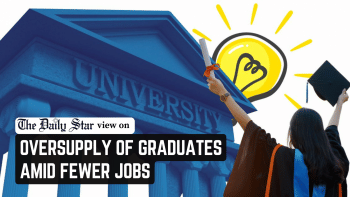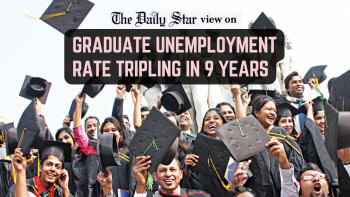University students deserve a better learning experience

"I am a ... student at ... University. I am having some difficulty with my faculty members. Most of the senior professors, I feel, are unable to teach ... They seem to have little idea about the grading system, curriculum and teaching process ... Is there anything we can do ...?"
– The Daily Star, April 5, 2005
"I have always felt that the education system in this country is broken … The classes are boring and the teachers are mostly insincere and uninterested in teaching …"
– The Daily Star, September 12, 2024
These two quotes have been taken from articles published on The Daily Star, 19 years apart. As evident in these quotes, learning experience in our universities has not improved over the years. Generations of students have been yearning for a decent learning experience, which we can no longer brush aside. One of the goals of education, besides crafting proper human beings, is to produce graduates who are employable in our increasingly complicated, sophisticated and tech-oriented economy. Ill-prepared graduates who go through a poor learning experience cannot satisfy the quality standard required by the job sector. Indeed, employers constantly complain about the low level of readiness of our graduates.
Teachers are the most important factor for the success of student learning in the classroom, as research has shown. Therefore, they have to take their teaching responsibility as a sacred duty. "Teaching is the profession upon which all other professions depend," says the World Bank Policy Approach to Teachers. In fact, one can argue that teaching is not just a profession, it is a life mission.
Teaching has two aspects: what to teach, and how to teach. University teachers in Bangladesh are rarely trained in the latter. In our university classrooms, passive lectures are still the dominant mode of teaching. Passive lecture, a teacher-centred mode of education, can be ineffective, unengaging, uninspiring, and boring. It leads to rote learning or surface learning, and doesn't help students to acquire the mastery of knowledge and achieve higher cognitive skills such as problem-solving, analysis, evaluation, synthesis, creation, etc. A prominent research study found that "… students in classes with traditional lecturing were 1.5 times more likely to fail than were students in classes with active learning" (PNAS, 2014). This finding prompted Prof Eric Mazur, a famous educationist and physics professor at Harvard University, to opine that "… it's almost unethical to be lecturing if you have this data" (Science, 2014).
But our universities don't have to adhere to passive lecturing. Educational sciences have seen tremendous developments over the years, and research in this field has led to the development of innovative teaching techniques that can make lectures more interactive, ensuring student participation. These techniques include think-pair-share, roleplay, jigsaw, minute paper, concept map, summarisation, muddiest point, etc. To instil higher cognitive skills, modern universities adopt other innovative modes of teaching and learning, such as problem-based learning, experiential learning, project-based learning, blended learning, cooperative learning, flipped classroom, inquiry-based learning, etc in addition to lectures. A well-trained teacher would choose an optimum blend of some of these techniques to maximise student learning.
University teachers should have solid foundational training in educational sciences and practice, and it has to be a continuous process throughout their career. To develop a culture of teaching excellence, teachers should create a community of practice to share their experience, and to support and learn from each other. Teachers must actively seek student feedback and then act upon it, as it is a powerful tool to improve teaching.
However, one cannot blame only the teachers for the poor learning experience of students. University authorities have the key responsibility to support teachers in achieving teaching excellence. Universities must create an atmosphere where teaching excellence is encouraged, nurtured, supported, and celebrated. Authorities must help create champions in quality teaching and let younger teachers learn from them. They must give awards to the deserving teachers recognising their dedication, hard work and success.
Modern universities have independent teaching and learning centres to support teaching excellence. These centres cater to the training needs of all levels of teachers, and support teachers to engage in the scholarship of teaching and learning (SoTL) and action research to investigate ways to improve teaching practice and disseminate best practice tips to all. Authorities must be forward-looking in adopting policies to employ new educational technologies, including artificial intelligence (AI), which is expected to have a big impact on education. Universities must make provisions to expose our teachers to international best practices.
The education ministry and the University Grants Commission (UGC) must realise that excellence in teaching and learning cannot happen automatically in our universities. It requires setting goals and proper implementation at the national level. They must support the universities in establishing teaching and learning centres. They should institute national-level awards for university teaching (UGC has awards for only research and publications). The Bangladesh Accreditation Council (BAC) is currently implementing Outcome-Based Education (OBE) in our universities. Fundamental to OBE is constructive alignment among (1) student outcomes, (2) teaching and learning activities, and (3) assessment. In this construct, teaching and learning activities are vital to achieving student outcomes, so that's where serious consideration should be given. In the past, the UGC, in partnership with the British Council, initiated a project named the Centre of Excellence in Teaching and Learning (CETL) to strengthen teaching and learning capacity in a few selected universities. The experience with this programme should be revisited. It should be revised and revived with the aim of improving its efficacy, wider applicability and long-term sustainability.
Our employers and industry cannot just demand high-quality graduates without doing their part either. They must play their role by engaging with academia, clearly articulating their needs, and supporting student training. They must help universities expose students to real-life scenarios by bringing industry problems to the classrooms. The government, UGC, and professionals have to facilitate such industry-academia collaboration.
Students, in turn, have important roles to play. As adult learners, university students must take responsibility for their own learning. They must realise that there is no alternative to diligence, discipline and hard work.
We cannot afford letting our university students go through poor learning experiences. Teachers, being the primary actors, should play a leadership role to improve the situation. They must restore pride in performing their basic duty. But university teachers need support from the key stakeholders, i.e. the university authorities, education ministry, UGC, and the employers. The reward and return that excellent teaching can bring for all are invaluable. The benefits are not just academic but, indeed, economic as well.
Dr A.S.M.A. Haseeb is professor and head of the Department of Nanomaterials and Ceramic Engineering at Bangladesh University of Engineering and Technology (BUET).
Views expressed in this article are the author's own.
Follow The Daily Star Opinion on Facebook for the latest opinions, commentaries and analyses by experts and professionals. To contribute your article or letter to The Daily Star Opinion, see our guidelines for submission.

 For all latest news, follow The Daily Star's Google News channel.
For all latest news, follow The Daily Star's Google News channel. 









Comments